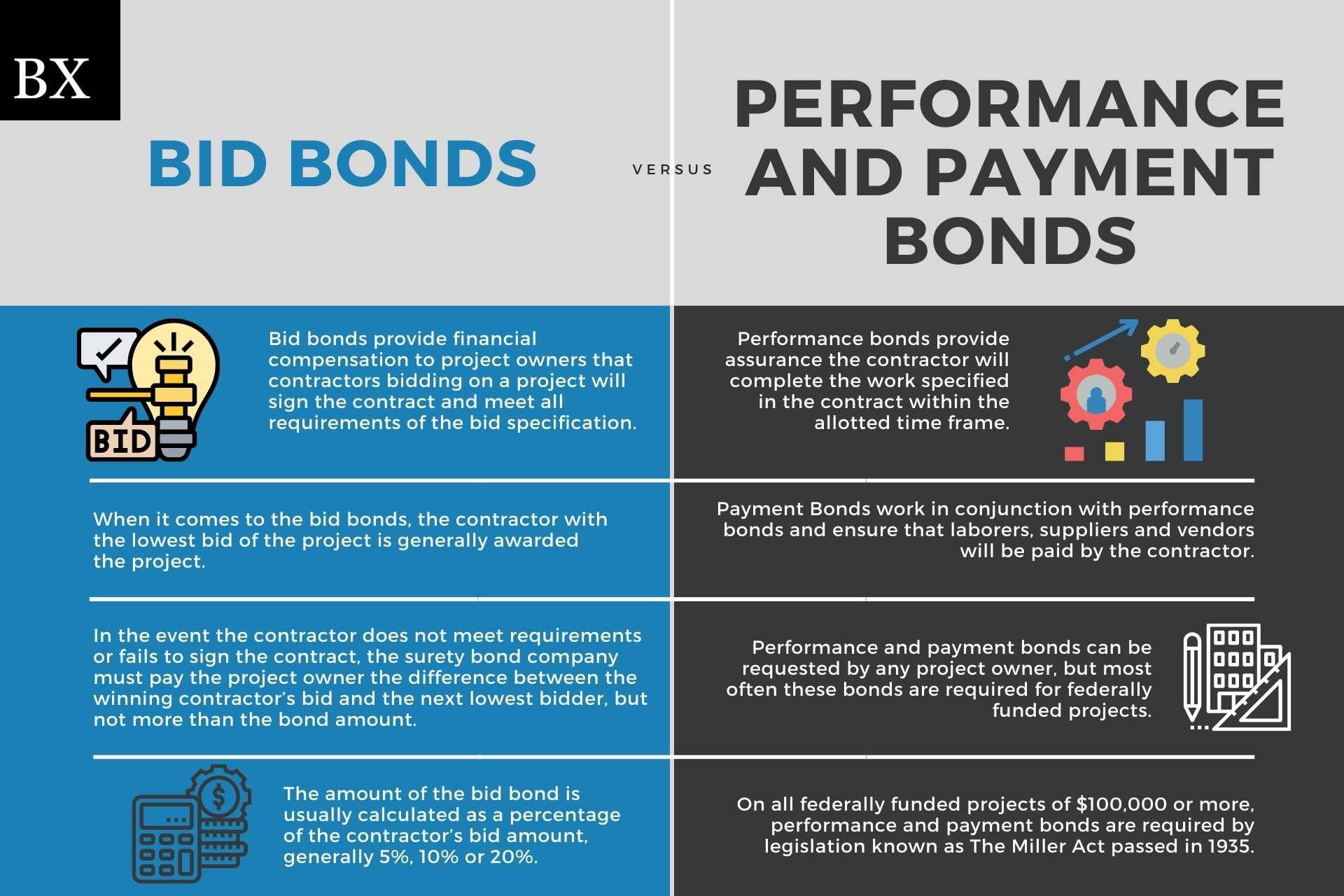Understanding Bid Bonds and Performance and Payment Bonds: The Complete Guide for Insurance Agents
Whether you’re a recently licensed insurance agent or a seasoned veteran of the industry, surety bonds, and particularly bid bonds and performance and payment bonds can be confusing. Between the legalese of the contract language and the internal jargon of the Surety Company, insurance agents tend to get stuck in the middle asking “Can we please just get this bond issued?!” Fortunately, the basics can be broken down into a few key definitions and explanations so agents can lean on surety experts like BondExchange to secure these important products for your contractor customers.
To start, we need to explain the definition of a contract bond.
Definition: Contract bonds are a type of surety bond that contractors purchase when bidding on or entering into a contract to perform work for a project owner. The most common types of contract bonds are Bid Bonds and Performance and Payment bonds.
Bid or Performance Bond Quote
Enter the business name to get a quote:
SECURE | NO OBLIGATION | WHOLESALE PRICING
What is a Bid Bond?
Most construction projects start with a bidding process, where eligible contractors submit their cost estimates (bids) to the project owner. The contractor with the lowest bid is generally awarded the project. But how can the project owner be confident that the bidders are qualified to complete the project?
Enter bid bonds. Bid bonds provide financial compensation to project owners that contractors bidding on a project will sign the contract and meet all requirements of the bid specifications, including the ability to provide a performance and/or payment bond, if the contractor is the winning bidder.
In the event the contractor does not meet these requirements or fails to sign the contract, the surety bond company must pay the project owner the difference between the winning contractor’s bid and the next lowest bidder, but not more than the bond amount. The amount of the bid bond is usually calculated as a percentage of the contractor’s bid amount, generally 5%, 10% or 20%.
What are Performance and Payment Bonds?
We learned that project owners can ensure they pick qualified bidders by requiring a bid bond. However, the bid bond does not protect the project owner beyond the bidding process. To provide a guarantee that the project will be completed, owners can require a performance and payment bond. Performance Bonds provide assurance to the project owner if a contractor fails to complete the work specified in the contract and within the allotted time frame.
Payment Bonds work in conjunction with performance bonds and ensure that laborers, suppliers and vendors will be paid by the contractor, preventing liens on the project that can affect the project owner and the success of the project.
Performance and payment bonds can be requested by any project owner, but most often these bonds are required for government owners (i.e. federal, state, and local government agencies). On all federally funded projects of $100,000 or more, performance and payment bonds are required by legislation known as The Miller Act passed in 1935. Many states and municipalities have adopted so-called “little Miller Acts” that extend similar surety bond requirements to state and local government projects.

What Questions Do You Need to Ask Your Contractor Customers?
Armed with some basic questions, insurance agents can quickly determine what type of bond will be needed and the information to get the underwriting process started. We recommend the following questions:
Determine the Bond Type:
If the answer is bidding, see the follow up questions below on bid bonds. Otherwise, skip down to performance and payment bonds.
The scope of work is important as some projects are riskier than others. If the contractor does not have experience in the scope of work to be performed, approval will be difficult.
For Bid Bonds:
For bids coming up soon, agents will need to act fast to secure the bid bond.
These documents provide the surety underwriter information on the project like estimated time frames, engineer’s estimates, warranty periods, and penalties for delays.
The underwriting will vary depending on the amount of the project. Typically, small projects (under $500,000) can be underwritten based on the owner’s personal credit. For larger jobs, underwriters will review business financials and more details about the contractor to determine eligibility.
For Performance and Payment Bonds:
If the contractor used a bid bond, why are they not using the same surety company to issue their performance and payment bond?
New businesses are generally limited to smaller projects until they have at least 1 year in business.
Larger jobs will require more in depth underwriting.
As a general rule of thumb, surety companies require the project size to be within 1.5 times the contractor's largest previous completed job.
Now that we know how to determine the type of bond, your customer is probably going to ask, “How much does the bond cost?”
How Much Does a Bid Bond or Performance and Payment Bond Cost?
Surety companies do not typically charge premium for Bid Bonds; however, some brokers may charge fees to issue a bond. BondExchange never charges for bid bonds.
Performance and Payment Bond premium rates are determined by the surety company based on the contractor’s credit, financial stability, and experience. Rate structures also vary based on the project size with smaller projects (under $1 million) typically carrying a 3% rate versus larger projects with rates ranging from 1% to 3%.
Most larger projects are rated using a sliding scale. Below is an example of the premium cost for a $1 million bond:
| Bond Amount | Premium Rate | Bond Cost |
|---|---|---|
| First $100,000 | 2.5% | $2,500 |
| Next $400,000 | 1.5% | $6,000 |
| Next $500,000 | 1% | $5,000 |
| Total cost of $13,500 |
Sometimes project costs run over the initial bid results, which result in an overrun. Because the premium is based on the bond amount, the surety company will charge an additional premium for the cost difference between the accepted bid and the final project cost. By contrast, projects completed for an amount lower than the initial bid will incur an underrun and the surety company will refund the difference in premium between the accepted bid and the final project cost.
One last important note on cost, the pricing for performance and payment bonds assumes both bonds will be issued and the rates above are the total for both bonds.
Why Should Agents Offer Contract Bonds?
Performance and Payment Bonds not only provide significant commission opportunities for agents, but can also help to create sticky client relationships. Agents that can tackle the often misunderstood surety bond product for contractors become trusted advisors to their contractor clients, leading to increased retention and cross-selling opportunities.
Initial underwriting for contract bonds can be fairly intrusive and comprehensive for your contractors, but once a surety line is established, the process going forward is pretty painless. Most contractors vigorously avoid the underwriting process, so securing that first bond is the key to success. BondExchange has great programs for emerging contractors that can position your agency to tackle the first bond with ease so you can capture business as the contractor’s business grows.
Construction contracts also often require other insurance products like general liability and workers compensation, opening up an easy cross-selling opportunity.
How Can an Insurance Agent Obtain Bid Bonds and Performance/Payment Bonds?
BondExchange makes obtaining Performance and Payment Bonds easy. We have developed programs for emerging contractors that require streamlined underwriting for projects up to $1 million in size. We can also help contractors with large, complex projects and even contractors with challenged credit. Our access to over 30 surety markets ensures we can secure your customer’s bond for nearly every situation.
Simply login to your account and use our keyword search to find “contract” bonds in our database. Don’t have a login? Click the Big Yellow Gain Access button below to set up your login. Our underwriting staff is available by phone, email or chat from 7:30 AM to 7:00 PM EST to assist you.
We're More Than Just Instant Issue

